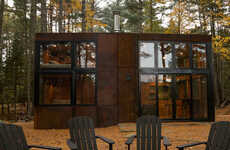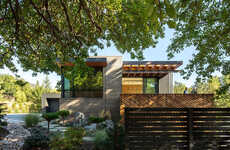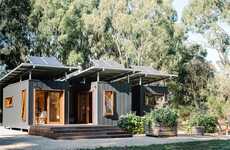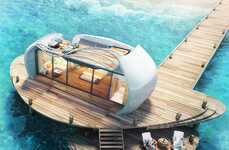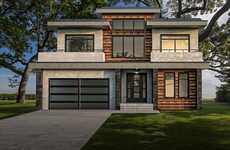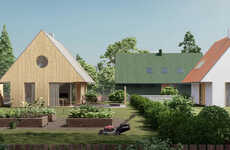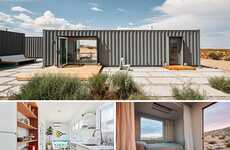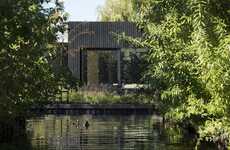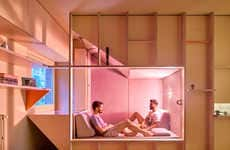
James Whitaker's Design is to Accent a Canadian Lakeside Site
References: whitakerstudio & dezeen
Prefabricated modular units have proven to be extremely convenience-focused, cost-effective and planet-conscious. Now, James Whitaker — the London-based architect behind the stacked shipping container studios, is planning of adorning a lakeside site in Alberta with a string of prefabricated modular units.
The irregular line presents a contemporary and experimental approach to housing developments. Whitaker envisions privacy-focused and communal areas. While the volume that contains the main living space enjoys a fully glazed facade that reveals striking panoramas of the surrounding nature, other components boast an enclosed interior that favors solitude. Dubbed the 'Anywhere House,' the property is envisioned to reach completion by 2019. It will be the first structural development to utilize the framework of James Whitaker's prefabricated modular system.
The irregular line presents a contemporary and experimental approach to housing developments. Whitaker envisions privacy-focused and communal areas. While the volume that contains the main living space enjoys a fully glazed facade that reveals striking panoramas of the surrounding nature, other components boast an enclosed interior that favors solitude. Dubbed the 'Anywhere House,' the property is envisioned to reach completion by 2019. It will be the first structural development to utilize the framework of James Whitaker's prefabricated modular system.
Trend Themes
1. Prefabricated Modular Units - The use of prefabricated modular units in architectural design presents opportunities for convenience, cost-effectiveness, and sustainability.
2. Stacked Shipping Container Studios - The use of stacked shipping container studios in housing developments offers a unique and experimental approach to contemporary design.
3. Privacy-focused and Communal Spaces - Designing housing developments with a balance of privacy-focused and communal areas provides innovative solutions for diverse living preferences.
Industry Implications
1. Architecture - The use of prefabricated modular units and unique design approaches create disruptive innovation opportunities within the architecture industry.
2. Construction - The adoption of prefabricated modular systems and unconventional building materials like shipping containers presents disruptive innovation opportunities within the construction industry.
3. Real Estate Development - Integrating privacy-focused and communal spaces in housing developments offers disruptive innovation opportunities for real estate developers to cater to diverse consumer demands.
6.9
Score
Popularity
Activity
Freshness

